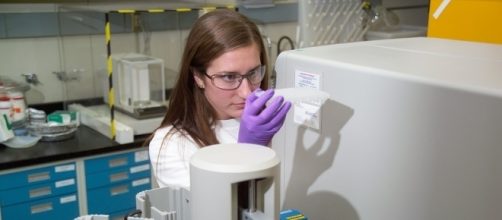CBS is reporting on a new Blood Test that is said to be able to predict autism with 98 percent accuracy in children between three and 10 years of age. In addition to being able to predict whether a child will later develop symptoms, the test is also said to be able to provide useful information with regard to "the severity of certain Autism-related conditions." One in 68 children in the United States is reported to be diagnosed with autism spectrum disorders, a diagnosis unveiled in 2013, replacing previous diagnoses, such as Asperger's Syndrome, autistic disorder, pervasive developmental disorder - not otherwise specified, and childhood disintegrative disorder.
Those who live with the condition experience a wide range of symptoms, with the most severe resulting in uncontrollable motions, and an inability to talk. Strong interests in narrow subject matter, and challenges with social interactions are also among traits exhibited by autists. Males are diagnosed with autism more often than females, for reasons that aren't completely understood, somewhat like the condition itself.
Autism diagnosis based on behavioral analysis
Diagnosis, for kids, currently relies upon the observation of a child's behavior, usually by a team of specialists. The new autism blood test is reported to detect the presence of "key metabolism markers." Head of genomic discovery with Autism Speaks, Mathew Pletcher, has "expressed reservations" about the new findings, stating that they follow in the footsteps of "previous work." He elaborated that he would be surprised to learn about the discovery of a "single molecular diagnostic test" that works for the entire autism spectrum.
New Scientist observed that the number of children with correct ASD diagnoses appears to be below that of neurotypical kids with incorrect ASD diagnoses, resulting in a situation where "a positive result would probably be wrong more often than not." Five molecular compounds the researchers tested for are said not to be "specific" to processes associated with autism.
Jonathan Green, with of the University of Manchester, characterized the results as giving an indication that something has "gone a bit awry with brain development." New Scientist states that the test still has value for selecting children who are good candidates for "behavioral testing," but notes that previous tests making similar claims have come up short; "yet to bear fruit," as characterized by Mr.
Green.
Five compounds thought to be related to autism
The research was reported to involve studying 24 measurements of autism-related "metabolic pathways or other biochemical markers." Five of the compounds studied were found to have predictive value among the 159 children included in the research, of which about half were said to have autism. Using the five compounds, researchers could predict whether a child in the group was autistic or neurotypical, with close to 100 percent accuracy.

